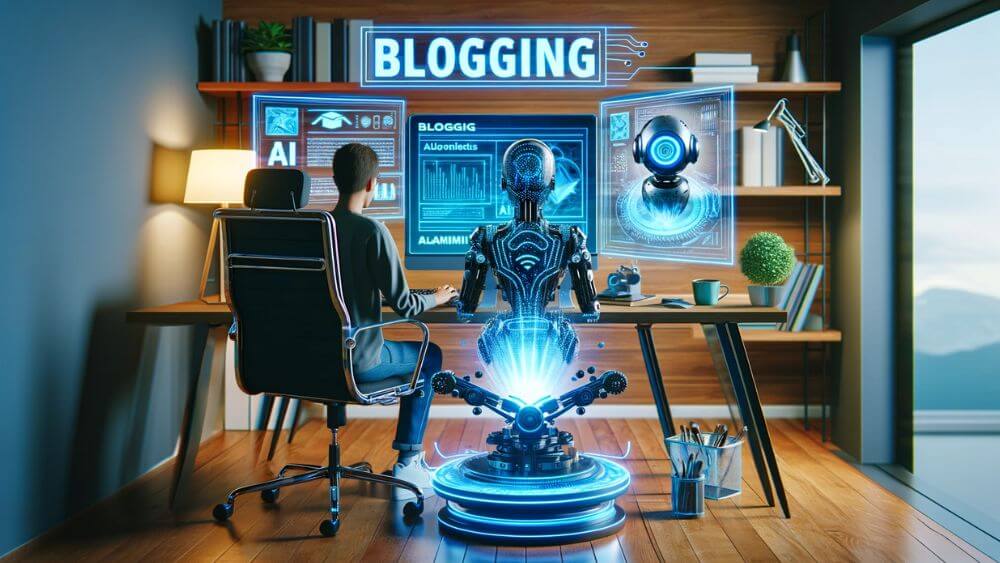Future Trends in Blogging and AI
Here’s why I decided to write about future trends in blogging and AI…
Future trends in blogging and AI are shaping the digital landscape. Bloggers are increasingly using AI tools to streamline content creation, improve SEO, and enhance user experiences. AI-driven content recommendations are also becoming more personalized, keeping readers engaged. As technology evolves, the synergy between blogging and AI promises to revolutionize online content creation and consumption. Stay updated on these exciting developments to stay ahead in the digital world.
- Future Trends in Blogging and AI
- Is Blogging Still Worth It in 2023?
- New Monetization Strategies for Bloggers
- Niche Blogging and Micro-Influencers
- The Importance of Storytelling
- Increased Emphasis on Authenticity and Transparency
- AI and Its Impact on Blogging
- Video Blogging and Its Growing Popularity
- The Rise of Micro-Blogging and Its Impact on Traditional Blogging
- The Future of Social Media and Its Relationship with Blogging
Future Trends in Blogging and AI
Welcome to the future of blogging! As technology continues to advance, the blogging landscape is undergoing significant transformations. One of the key driving forces behind these changes is artificial intelligence (AI). AI is revolutionizing the way bloggers create and consume content, and its impact is poised to shape the future of blogging in exciting ways.
Blogging has experienced remarkable growth in recent years, with a 12% increase since 2015. This upward trend shows no signs of slowing down as AI brings new possibilities to the table. From content creation to audience engagement, AI will play a pivotal role in reshaping the blogging industry.
One of the noticeable shifts we can expect is the integration of multimedia elements, such as videos and interactive content, into blog posts. These engaging formats will enhance the reader experience and open up new avenues for content creators to express their ideas.
Niche blogging and SEO strategies will also become even more critical in the future. With the ever-increasing competition in the digital landscape, focusing on specific topics and optimizing content for search engines will be essential for bloggers to maintain visibility and attract their target audience.
In this article, we will explore the future of blogging with AI in greater detail. We will discuss the worth of blogging in 2023, new monetization strategies for bloggers, the rise of niche blogging and micro-influencers, the importance of storytelling, the emphasis on authenticity and transparency, the impact of AI on blogging, the growing popularity of video blogging, the influence of micro-blogging, and the evolving relationship between social media and blogging.
Are you ready to dive into the exciting world of blogging’s future? Let’s start exploring the possibilities!

Is Blogging Still Worth It in 2023?
The future of blogging is constantly evolving, shaped by advancements in technology and the impact of AI. In this era of short-form content on social media platforms, some may question the worth of blogging in 2023. However, blogs continue to hold immense value and present unique opportunities for individuals and businesses alike.
Blogging provides a distinct space for in-depth discussions, thoughtful analysis, and thought leadership. It allows bloggers to showcase their expertise, share valuable insights, and engage with a dedicated audience. While social media platforms offer quick and easily digestible content, blogs offer a more comprehensive and immersive experience.
For businesses, blogs are crucial for brand building, establishing credibility, and increasing search engine visibility. Search engines favor websites with high-quality, informative content, resulting in higher organic rankings and increased website traffic. Blogs also enhance thought leadership by positioning individuals or businesses as authoritative voices within their respective industries.
However, the evolving digital landscape does present challenges. Attention spans have diminished, and the preference for quick, easily consumable content is on the rise. To adapt, bloggers must refine their writing styles, capturing and retaining readers’ attention in a world of information overload.
Investing in promotion is equally essential. With the proliferation of online content, simply publishing a blog post is no longer sufficient. Implementing effective SEO strategies, leveraging social media platforms, and forming collaborative partnerships can significantly increase the reach and impact of a blog.
Ultimately, the worth of blogging in 2023 hinges on one’s goals and the ability to embrace change. By staying authentic, delivering valuable content, and adapting to emerging trends, bloggers can continue to thrive in the age of AI and digital transformation.
As the blogging landscape evolves, it is important to navigate the changing tide and leverage the advantages of both short-form content on social media platforms and long-form content on blogs. Both mediums serve different purposes and can be integrated effectively to maximize reach and engagement.
So, is blogging still worth it in 2023? Absolutely. With the right strategies, a strong focus on quality, and adaptation to emerging trends, blogging remains a powerful tool for self-expression, communication, and establishing a digital presence.
| Benefits of Blogging in 2023 | Challenges and Considerations |
|---|---|
| Brand building and thought leadership | Diminishing attention spans |
| Improved search engine visibility | Preference for quick, easily consumable content |
| In-depth discussions and analysis | Increased competition in the digital landscape |
| Engaging with a dedicated audience | Evolution of SEO strategies |
| Opportunities for collaboration and partnerships | Adapting writing styles to capture readers’ attention |
New Monetization Strategies for Bloggers
Blogging has transformed from a mere hobby to a lucrative income source. As the blogging industry continues to evolve, bloggers are exploring innovative ways to monetize their content and maximize their earning potential. In this section, we will explore some of the latest monetization strategies that bloggers are adopting in order to thrive in the digital landscape.

Influencer Marketing: Partnering with Brands
Influencer marketing has emerged as a powerful monetization strategy for bloggers. By partnering with brands, bloggers can promote products or services in exchange for compensation. This mutually beneficial relationship allows bloggers to leverage their influence and reach a wider audience, while brands benefit from the bloggers’ credibility and engaged followers.
Through influencer marketing, bloggers can create sponsored content that seamlessly integrates with their own style and values. By authentically endorsing products or services that align with their niche, bloggers can build trust with their audience and generate additional revenue.
Subscription Models: Offering Exclusive Content
Subscription models have gained popularity as an alternative monetization strategy for bloggers. By offering exclusive content or services to subscribers for a recurring fee, bloggers can generate a steady stream of income. This not only rewards loyal readers but also allows bloggers to provide additional value to their dedicated audience.
Subscriptions can take various forms, such as access to premium articles, exclusive videos, or personalized content. By leveraging their expertise and unique insights, bloggers can create compelling subscription packages that cater to the specific needs and interests of their audience.
Diversifying Revenue Streams with Traditional Methods
While new monetization strategies are on the rise, traditional methods of monetization such as advertising and affiliate marketing still hold their ground. Bloggers can leverage their platform to display advertisements and earn revenue based on impressions or clicks. Additionally, by becoming affiliates for brands and promoting their products or services, bloggers can earn commissions for each successful referral.
By diversifying their revenue streams and combining different monetization strategies, bloggers can safeguard their income and adapt to changes in the industry. This allows them to maximize their earning potential while maintaining a sustainable blogging business.
Optimizing Monetization with AI-Powered Blogging
The rise of AI-powered blogging tools has revolutionized the way bloggers monetize their content. AI algorithms analyze consumer data to personalize recommendations and advertisements, increasing engagement and conversions. With AI, bloggers can optimize their content for monetization by understanding their audience’s preferences and delivering highly relevant ads or product recommendations.
Furthermore, AI-powered content creation tools assist bloggers in generating high-quality content more efficiently. By automating repetitive tasks, bloggers can focus on creating valuable and engaging content, leading to increased traffic, loyal readership, and ultimately, higher monetization potential.
As bloggers navigate the ever-changing landscape of digital monetization, it is important to stay informed about emerging trends and adapt accordingly. By embracing new strategies, leveraging AI-powered tools, and diversifying revenue streams, bloggers can position themselves for long-term success in the evolving world of blogging.

Niche Blogging and Micro-Influencers
Niche blogging offers a valuable opportunity for bloggers to focus on specific topics that resonate with a dedicated audience. By honing in on a niche, bloggers can differentiate themselves from the competition and build a loyal following.
One emerging trend in the blogging world is the rise of micro-influencers. Unlike macro-influencers with millions of followers, micro-influencers have a smaller but highly engaged audience.
Brands are increasingly recognizing the value of micro-influencers for their authenticity and genuine connections with their followers. Micro-influencers are seen as relatable and trustworthy, making them attractive partners for brand collaborations.
A key advantage of niche blogging and working with micro-influencers is the ability to target an audience with specific interests or needs. This targeted approach allows bloggers and influencers to establish themselves as authorities within their niche and gain credibility among their followers.
With the help of AI-driven tools, bloggers can identify and connect with their niche audience more effectively. These tools analyze data and provide valuable insights to inform content creation and marketing strategies. By leveraging AI technology, bloggers can optimize their efforts and reach the right audience with their valuable content.
In summary, niche blogging and micro-influencers play a significant role in blogging trends in the AI era. By focusing on specific topics and collaborating with micro-influencers, bloggers can stand out in a crowded online space, build a loyal audience, and leverage AI-driven tools to enhance their blogging efforts.
The Importance of Storytelling
Storytelling plays a crucial role in the world of blogging. It allows bloggers to establish a deeper connection with their readers by sharing personal experiences and insights. By crafting compelling narratives, bloggers can build authenticity and credibility, creating a unique brand that stands out in a sea of content.
When bloggers incorporate storytelling into their posts, it makes the content more engaging and relatable. Readers are drawn into the story, captivated by the narrative and the emotions it evokes. It helps create a sense of empathy and connection, keeping readers coming back for more.
One effective way to implement storytelling in blogging is by focusing on real-life examples. By sharing personal anecdotes and experiences, bloggers can make their content more relatable and human. Readers appreciate authenticity, and storytelling is an excellent way to showcase the blogger’s personality and perspective.
Additionally, storytelling helps bloggers differentiate themselves from others in their niche. It allows them to convey their unique voice and perspective, making their content stand out in a crowded digital landscape. By weaving storytelling elements into their posts, bloggers can build a loyal readership that resonates with their authentic storytelling style.
Advancements in AI content creation tools have made it easier for bloggers to create compelling stories. With the assistance of AI algorithms, bloggers can analyze data and generate content that resonates with their audience. These tools provide invaluable support, helping bloggers craft narratives that engage readers and keep them coming back for more.

The Power of Storytelling in Blogging
- Establishes authenticity and credibility.
- Makes content more engaging and relatable.
- Differentiates bloggers and builds a unique brand.
- Allows bloggers to showcase their personality and perspective.
- Assisted by AI tools for more effective storytelling.
Increased Emphasis on Authenticity and Transparency
The blogging industry places a strong emphasis on authenticity and transparency. As a blogger, it is crucial to establish yourself as an honest and genuine content creator. When you stay true to yourself and share your personal beliefs and experiences, you build trust with your audience. Being open and transparent about any potential conflicts of interest further strengthens this trust.
Authenticity in blogging creates meaningful connections with your readers. They are looking for real, relatable voices in a crowded online space. By being authentic, you not only attract loyal readers but also differentiate yourself from others.
Transparency is another key aspect of content creation. It involves being open with your audience, whether it’s about your background, motivations, or the products and services you promote. Being transparent builds trust and credibility, making your readers feel confident in your recommendations.
Creating an authentic and transparent online presence is more important than ever. In a world where misinformation and paid endorsements are prevalent, readers crave genuine content. By being authentic and transparent, you can establish yourself as a trusted authority in your niche.
A Comparison of Authentic and Non-Authentic Blogs
| Authentic Blog | Non-Authentic Blog |
|---|---|
| Written in a genuine, relatable voice | Uses generic, impersonal language |
| Shares personal experiences and insights | Lacks personal touch; focuses solely on promoting products |
| Discloses any conflicts of interest | Doesn’t disclose affiliations or potential biases |
| Engages in meaningful conversations with readers | Responds inconsistently or dismisses readers’ comments |
In the table above, you can see a comparison between an authentic blog and a non-authentic blog. Authentic blogs prioritize building connections, sharing personal experiences, and engaging with readers. On the other hand, non-authentic blogs focus solely on promotion, lack transparency, and fail to establish meaningful relationships with their audience.
In conclusion, authenticity and transparency are vital for success in the blogging industry. By staying true to yourself, sharing personal experiences, and being transparent with your audience, you can establish trust and build a loyal following.
AI and Its Impact on Blogging
Artificial intelligence (AI) is revolutionizing the blogging industry by introducing automated content creation tools and personalized algorithms. These advancements have a profound impact on content creation, distribution, and monetization. With AI-powered tools, bloggers can streamline their workflow, freeing up time for more creative tasks. Content creation tools powered by AI can analyze data and generate articles, ensuring consistent and high-quality content production.
AI algorithms are capable of personalizing recommendations and advertising, enhancing user engagement and driving monetization opportunities. By leveraging AI, bloggers can deliver personalized and relevant content to their audience, leading to increased reader engagement and loyalty.
As technology continues to evolve, AI’s impact on blogging will continue to grow. New opportunities will emerge for bloggers to create, distribute, and monetize their content. AI offers bloggers the potential to reach wider audiences, attract new readers, and stay ahead of the evolving industry trends.
The Benefits of AI in Blogging
- Time-saving: AI-powered content creation tools automate the process of generating articles, saving bloggers valuable time that can be used for other creative tasks.
- Personalization: AI algorithms enable bloggers to personalize recommendations and advertising, providing a tailored experience for their readers and increasing engagement.
- Improved monetization: AI-powered tools can analyze data and optimize monetization strategies, enabling bloggers to generate more revenue from their blogs.
- Enhanced content quality: Through AI, bloggers can ensure consistent content quality by applying automated proofreading and editing tools.
- Data-driven insights: AI algorithms can analyze data and provide bloggers with valuable insights into their audience, helping them refine their content strategy and better understand reader preferences.
AI is reshaping the blogging landscape and presenting new possibilities for bloggers looking to stay ahead of the curve. By embracing AI-powered tools and algorithms, bloggers can enhance their content creation process, optimize engagement and monetization strategies, and deliver a personalized experience to their audience.
Video Blogging and Its Growing Popularity
Video blogging, or vlogging, has experienced a surge in popularity in recent years. As bloggers strive to connect with their audience in more impactful ways, videos have emerged as a highly engaging and interactive medium. With the accessibility of video production equipment and editing software, creating high-quality video content has become easier than ever before. Vlogging allows bloggers to showcase their personalities, perspectives, and expertise in a more immediate and authentic way.
Through video blogging, you can capture your audience’s attention through captivating visuals, dynamic storytelling, and engaging delivery. By leveraging the power of videos, you can not only convey information but also evoke emotions and create a deeper connection with your viewers. Whether you’re demonstrating a tutorial, sharing a personal experience, or presenting your expertise, videos offer a versatile platform to engage and resonate with your audience.
One of the key advantages of video blogging is its ability to convey non-verbal cues such as facial expressions, body language, and tone of voice, which can significantly enhance the impact of your message. This visual medium enables you to communicate nuances and emotions more effectively, allowing your audience to better understand and relate to your content.
As the internet becomes increasingly video-centric, incorporating video content into your blogging strategy becomes essential for staying relevant and capturing the attention of your target audience. By diversifying your content with videos, you can attract new viewers, increase engagement, and extend your reach across different platforms and social media channels.

The Rise of Micro-Blogging and Its Impact on Traditional Blogging
Micro-blogging platforms like Twitter and Instagram have revolutionized the way we share and consume content. The popularity of micro-blogging has had a significant impact on traditional blogging, presenting both challenges and opportunities for bloggers in the digital age.
Micro-blogging allows for quick updates and real-time sharing of experiences, providing a more immediate and personal connection with the audience. However, it also requires a more concise and direct writing approach, as character limits and the fast-paced nature of micro-blogging platforms demand brevity.
Adapting to the micro-blogging trend is crucial for bloggers who want to stay relevant and effectively engage with their audience. While traditional long-form content offers in-depth discussions and thought leadership, integrating micro-blogging alongside traditional blogging can enhance reach and engagement.
Bloggers can use micro-blogging platforms to supplement their long-form content by sharing teasers or relevant snippets from their blog posts. By leveraging micro-blogging, bloggers can drive traffic to their blogs, attract new readers, and maintain an active online presence. Additionally, micro-blogging allows bloggers to tap into trending topics and spark conversations that can generate further interest in their blog.
However, it is important to strike a balance between micro-blogging and traditional blogging. While micro-blogging offers immediacy, authenticity, and the ability to connect with a wide audience, long-form content allows for a more comprehensive exploration of topics and provides a platform for more in-depth analysis and storytelling.
Ultimately, bloggers need to adapt their writing styles and find ways to effectively utilize micro-blogging alongside traditional long-form content to maximize the impact on their audience. By embracing the micro-blogging trend and exploring its potential, bloggers can expand their reach, engage with their audience in new ways, and stay relevant in the ever-evolving digital landscape.
| Micro-Blogging | Traditional Blogging |
|---|---|
| Quick updates and real-time sharing | In-depth discussions and thought leadership |
| Concise and direct writing approach | Comprehensive exploration of topics |
| Immediate and personal connection with the audience | Platform for storytelling and analysis |
| Supplemental content for driving traffic to blogs | Opportunity for long-form engagement and exploration |
| Trending topics and conversations | Establishing unique brand and thought leadership |
The Future of Social Media and Its Relationship with Blogging
Social media and blogging have become inseparable entities, and their connection is poised to undergo further transformation. As social media platforms continue to take center stage in content sharing and consumption, the boundaries between social media and blogging are becoming increasingly blurred. The prevalence of video and multimedia content on social media is reshaping how bloggers engage with their audience, presenting new opportunities and challenges.
The integration of social media into the blogging landscape will foster greater collaboration and competition between these two mediums. Bloggers will need to adapt their strategies to leverage social media platforms effectively while maintaining the integrity and authenticity of their blogs. This integration will pave the way for cross-promotion and cross-platform content distribution, allowing bloggers to reach a wider audience and extend their influence.
Another noteworthy trend is the rise of interactive content, which is gaining significance in both social media and blogging. Providing a more immersive and participatory experience, interactive content allows users to engage with the material actively. This trend will further enhance user engagement and promote a sense of community, propelling the future of social media and blogging.
The future of social media and its relationship with blogging promises endless possibilities for content creators. By embracing the integration of these two platforms, bloggers can harness the power of social media to amplify their reach, while still maintaining their unique voice and storytelling capabilities through blogging.
I think that concludes future trends in blogging and AI. I hope you liked this article. Share your comments in the section below. Cheerio!


Przemo Bania is a blogger and writer whose love of blogging began as an impulse, not as a hobby but a necessity, seeing his wife struggle with endometriosis. Przemo runs two other blogs which you can find by reading his story…

